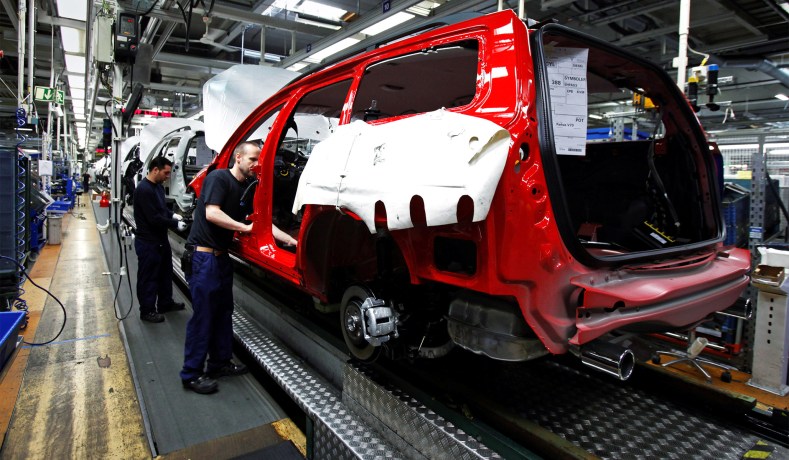Commentary
Sweden, once the ‘avant garde,’ risks reversing its history
With the nationalist-populist right suging in Swedish polls and rising inequality, the Social Democrats stand a real chance of losing their unrivaled power.

The news from Sweden could hardly be worse. Even there, the nationalist-populist right is surging in the polls, and it looks potent enough to deal a doubly lethal blow to the political system.
The Social Democrats would lose the top spot, which they have held unrivaled ever since universal suffrage was introduced in 1918, breaking the long dominance of a particularly regressive censitary vote system. But even the largest liberal-conservative party, the Moderaterna, is stuck at 15 percent, and it is doubtful that another center-right party will even be able to enter Parliament: the Christian Democrats are polling under the electoral threshold of 4 percent.
On the left, only the post-Communist Vänsterpartiet seems to be able to gain a significant share of votes. The situation is one of total upheaval, with the far-right Swedish Democrats (Sverigedemokraterna) set to take first place with 25 percent, which would render the country ungovernable by any coalition imaginable at this point.
Some like to assume that European history is simple: Nordic people are peaceful by nature and tend to be enlightened and progressive, while Mediterranean people are the opposite. But the reality is that until the 1920s, around 20 percent of Sweden’s poor population (just as poor as Italy’s) was forced to emigrate, with a very strong class hierarchy and the most turbulent social and labor conditions in Europe until the 1930s, with harsh conflicts in which violence was not a rare occurrence.
It was only in 1934 that everything changed, with the agreement between the Social Democrats and the Farmers’ League, which until that time had been very conservative if not outright reactionary. The social question joined farmers and workers together in a compromise in which the issue of the former was, at its heart, that of the other, and vice versa. The Great Depression was defeated, and thus began the story of Sweden as the social-democratic vanguard of the world, in between communism, whose oppression (particularly that of the workers) it rejected, and capitalism, in which it saw inequality as an injustice that couldn’t be fixed by free elections.
According to expert measurements, in the 1980s the equality indicators achieved in Sweden as a result of this approach were the greatest in recorded history, although probably still smaller than in primitive communal societies. However, in the 1990s many things changed, and not for the better. Since then, the increase in inequality that has been measured everywhere has been the highest in Sweden out of all advanced economies. The annual GDP growth is very good, with a budget surplus and a foreign trade balance that are net positives, but the current situation shows that even though positive statistics are important, the quality of the growth and its unequal distribution, as well as the fixation on deficit reduction, are politically lethal, and not just for the left. The Social Democrats, in government for most of the time since 1991, gave priority to balancing public accounts, and did not truly roll back the measures introduced by the “bourgeois” governments of 1991-1994 and 2006-2014.
The last center-right government, like many liberal-conservatives and liberal-progressives, thought job insecurity and the reduction of the notion of welfare to the measurement of market signals (according to the so-called New Public Management) were compatible with being open toward hundreds of thousands of refugees, in addition to the 20 percent of the population which already was of non-Swedish background. In a famous speech, Fredrik Reinfeldt, the last liberal-conservative prime minister, described a view of Sweden from far above, with plenty of space for many new arrivals, and exhorted his countrymen to “open your hearts.” At the very same time, individualistic profit was being encouraged to the extreme.
An interesting fact: according to a study by the large trade union confederation LO (Högerpopulismen och jämlikheten – “Right-wing populism and equality”), negative attitudes toward immigration have not increased. What has grown is the number of people who believe the issue is such a priority that they are willing to break with their political and voting loyalties. In this way, the current outbreak of intolerance (from the permissive attitude toward the Sverigedemokraterna’s aggressiveness, to the online lynch mob that rose up against Durmaz, the Swedish footballer of Syriac heritage who was guilty of a mistake that cost the yellow-blue national team at the soccer World Cup) can be seen in a new way.
Rather than blaming the “ignorance of the people,” as is simple mindedly being done in Italy (but as we see, there is decline even in well-educated Scandinavia), Sweden slipping toward the right shows that unions and parties like the Social Democrats can only make their voters “stop and think” if their policies remain front and center. Only then will they stop retreating from their own proper ground in political arguments, and only then will they take back the space now given to other arguments and obsessions. Conversely, the classical liberal-conservative center-right can only get their unfair tax cuts and welfare privatization as long as the social-democratic foundations are still conspicuous enough to provide balance.
Otherwise, if this goes further, even the middle classes will decline and start “losing their minds.” And Sweden might reverse the course of its history.
Originally published at https://ilmanifesto.it/svezia-il-vecchio-paese-avanguardia-pronto-a-invertire-il-corso-della-propria-storia/ on 2018-09-05
